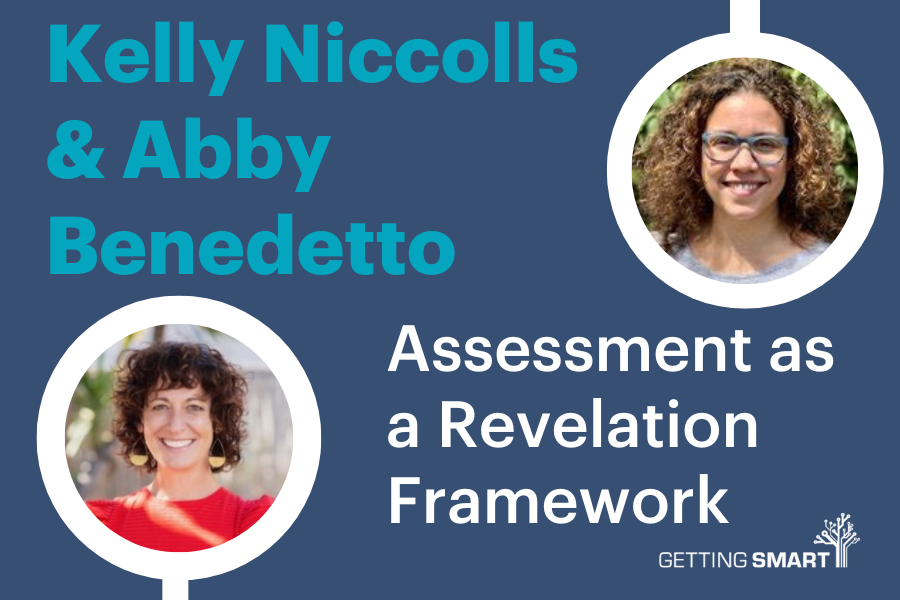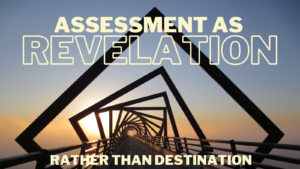Kelly Niccolls and Abby Benedetto on Assessment as a Revelation Framework
Key Points
-
We need invitations for learners to bring all of their identities and lean into the why.
-
You have a responsibility to give back to a collective idea.

On this episode of the Getting Smart Podcast Rebecca Midles is joined by two dear friends and peers: Kelly Niccolls and Abby Benedetto. Kelly Niccolls is formerly a Getting Smart colleague and now leads Secondary Teaching and Learning at Cheney Public Schools.
Abby Benedetto is one of Getting Smart’s Senior Fellows and is also the founder of Core Shifts.
Listen in as they discuss the Assessment as Revelation framework. We also recently published a blog by them on GettingSmart.com all about the framework. Check it out!
The world doesn’t need another framework, but the world does need to rethink assessment.
Abby Benedetto
Rebecca Midles: You’re listening to the Getting Smart Podcast. I’m Rebecca Midles, and today I’m joined by two dear friends and peers, Kelly Nicholls and Abby Benedetto.
Kelly Nicholls: Perfect.
Rebecca Midles: Kelly, formerly a Getting Smart colleague, now leads secondary teaching and learning at Cheney Public Schools here in Washington. Abby is one of our senior fellows for the New Pathways campaign and the founder of Course Shifts. I also get to work on several projects with her. I’m so happy to have you both here today. Welcome! I’m honored to be talking with you and for us to co-create space and share about the Assessment as Revelation framework. Let’s start with a good “why” question: why this framework, and why now?
Abby Benedetto: That’s a great question. The way I answer it in my own mind, and when Kelly and I were sort of dreaming this up, is that the world does not need another framework—let’s be real. But the world really needs to rethink assessment. I just think that as we continue to push on and really try to think about public education in this country, we keep running up against these antiquated notions that assessment is how we sort and track young people. That assessment is punitive, a lever to maintain systemic oppression, and that it keeps certain students marginalized. Rather than seeing it as an opportunity for young people to discover what is beautiful inside them, assessment is often used to control what a student knows and what they don’t. So, we were drawn to figure out how to dream up, in our most ridiculous sort of possibilities, a different way of thinking about assessment. It feels like we’re at a moment of intersection and possibility within schools around the country. There’s an opportunity to provide people with tools and a new mental model for thinking about assessment.
Rebecca Midles: I love that. I love the partnership piece you’re highlighting because I think a lot of people talk about agency, but we don’t really have systemic approaches for what that looks like. Without putting learners at the center from the very beginning, it’s pretty hard to do. Thank you for sharing that. I feel like we need to know how this framework came about.
Kelly Nicholls: Absolutely. Abby and I are Deeper Learning Equity Fellows from Cohort Three, and that’s how we met and became besties.
Rebecca Midles: Shoutout to your cohort!
Kelly Nicholls: Yes! We’ve stayed in touch and developed a wonderful friendship and bond, especially with one of our other fellows. This intersected with our work, particularly as Abby has partnered with Getting Smart, and as I’ve worked in education spaces with her. I signed us up for something as an equity fellow, which led to proposing a session for the Big Picture Learning Big Bang Summer Conference. I texted Abby, saying, “Hey, do you want to do liberatory assessment with me?” She said yes. One key reason I thought of Abby was because she’s a kindred spirit in our attempts to dismantle traditional school systems. I knew we could create a workshop to engage people in learning to unlearn and share a counter-narrative. There’s a need to shift assessment, and I think we developed this framework to scaffold how you could walk alongside an assessment, rather than imposing something upon the learner.
Rebecca Midles: I remember hearing it was a huge hit, and there was a lot of excitement, a packed room, and requests to keep it going. I love that it continued! Could you elaborate on the framework being about walking along, sharing the path, and co-creating? Does that truly embrace assessment as learning?
Kelly Nicholls: Yes, exactly. The framework embodies what Abby and I talked about—there’s so much harm in traditional assessment practices. We use the term “wayfinding” specifically to reframe this. Wayfinding has deep roots in various Indigenous cultures globally, where communities navigate without a fixed destination, trusting they have what they need within. For our framework, wayfinding isn’t about a pre-determined endpoint. In traditional systems, we create assessments and a scope of learning to reach those assessments, guiding students to show us what we want to see in the way we want to see it. Revelatory assessment is the opposite—we don’t know where we’re going. We’re wayfinding, defining it as a journey that trusts we have what we need within us. It’s about creating relationships within our communities and with the land, recognizing that we learn alongside the earth and each other.
Abby Benedetto: I just wanted to add something to the beauty Kelly shared about wayfinding. It’s a powerful way to approach learning as a shared journey, without a rigid destination.
Rebecca Midles: Thank you for sharing that—it really helps us understand it better. What are ways that the two of you, and others you’ve enlisted, can support adults and young people in this journey?
Abby Benedetto: That’s the question, right? Anytime we’re trying to shift mental models, practices, or pedagogy, it’s always about figuring out the “how.” What I love about how we designed this framework is that we identified the mindset shifts needed for each element. When we presented this in the summer, the overwhelming response was, “That’s actually what we need first.” Before we give examples of how to build an assessment, adults—who are the facilitators of learning—need to address their internal models. They need to reflect on their experiences with assessment, understand how those have impacted their feelings and thoughts, and be willing to shift their thinking and practice, which is complex but necessary.
Rebecca Midles: That’s powerful. I can see why you wouldn’t want to skip that piece. You want those leading this work with learners by their side to experience it themselves.
Kelly Nicholls: Exactly, and that’s where the framework supports contextualizing their mindset. We need to understand who we are and what we need to be. We aspire to embody lifelong learning and growth. We want to break the cycles of dysfunction we see in education by doing the internal work within ourselves and the system. I hope this framework can be a catalyst for identifying what was, what needs to be, who we are, and who we need to be to engage in learning differently.
Rebecca Midles: Yes.
Kelly Nicholls: Also, we’re careful not to repurpose the same tools. I always say, “The master’s tools will not dismantle the master’s house.” We don’t want to rebuild a flawed system; instead, we design the framework to avoid perpetuating dysfunction or harm. We want to live in inquiry and possibility, learning alongside each other.
Rebecca Midles: I think this framework is already sparking the right conversations. Can you tell me more about the components? I know listeners can check the blog for details, but for those listening now…
Abby Benedetto: Absolutely. We wanted to ensure the framework embodies the principles we’re discussing. It’s not rigid because that would contradict the idea of revelatory assessment. We came up with five characteristics to rethink assessment. These characteristics are based on research, lived experiences, and examples worldwide.
The first is “personal.” Any assessment experience should be designed by the learner in collaboration with a facilitator, in a way that feels purposeful and meaningful. It should allow learners to bring their whole identities into the learning moment.
Second is “narrational,” challenging the focus on quantitative data and test scores. We say, “That’s not the only way to measure learning.” Narrational assessment centers storytelling and non-quantifiable ways to demonstrate understanding, allowing learners to be the authors of their own learning journey.
Third, “relational,” captures the essence of “sitting beside.” It values mutual engagement and breaks down traditional power dynamics in learning.
Fourth is “iterative.” Revelatory assessment is not a one-time event; it’s a cycle of growth, revisited continuously as insights and learning evolve.
Lastly, “reciprocal.” Initially, we had only four elements, but after speaking with Denise Asphia, founding principal of a Native Hawaiian charter school, we learned of the importance of reciprocity. In Native Hawaiian culture, learning is not just for oneself but to give back to others. Learning is collective, and that’s essential for assessment.
Rebecca Midles: Those are beautiful. You’re honoring students’ connections to their social networks and communities. You’re showing how we can honor that in their work and co-designing their path with those elements. Kelly, do you have anything to add?
Kelly Nicholls: No, I think Abby covered it perfectly.
Rebecca Midles: What does this mean for our practice as educators and for our learning systems?
Kelly Nicholls: It means we need to do things differently. If a school or teacher embraced this approach, it would transform schooling. Our framework builds on the legacy of our ancestors. Communities have engaged in this type of learning for millennia, and we’re trying to move away from the “factory” model of education. This framework would eliminate grade levels and the notion that graduation marks the end of learning. Lifelong learning means growth that extends beyond formal education.
Imagine students growing with the understanding that learning isn’t tied to a building or system but is part of being human. Society needs this shift; humanity needs ways to live in “right relationship” with each other and the earth, and this type of education can help.
Rebecca Midles: Revolutionary indeed. This approach isn’t just moving beyond the Industrial Revolution model but creating the future we deserve. What’s next for both of you in this work?
Abby Benedetto: We’re excited to keep sharing this framework and learning as we go. Emergent strategy, as explained by adrienne maree brown, is the idea that learning is always emerging—it’s constantly evolving. Our framework is our best guess for now, but we’re continually finding new examples and insights, learning how to implement this across different contexts. We want to keep dreaming alongside others and sharing this vision because it has the power to change the experiences of young people and facilitators in learning environments. People are working within constraints, but we’re learning together how to navigate these systems more effectively.
Rebecca Midles: How can people reach out to you? We’ll put that in the show notes.
Abby Benedetto: Thank you so much, and thank you, Rebecca. Kelly mentioned it, but I have learned so much from you. You’ve shaped how this country thinks about competency-based education, which is a foundational element in revelatory assessment. We’re grateful for your leadership and vision.
Kelly Nicholls: Yes, much love to all of you. You’re dear friends, and I appreciate learning alongside and from you. And thank you, Mason, for producing this podcast and helping us share our work.
Rebecca Midles: Very kind. Thank you, both.
Links:







0 Comments
Leave a Comment
Your email address will not be published. All fields are required.